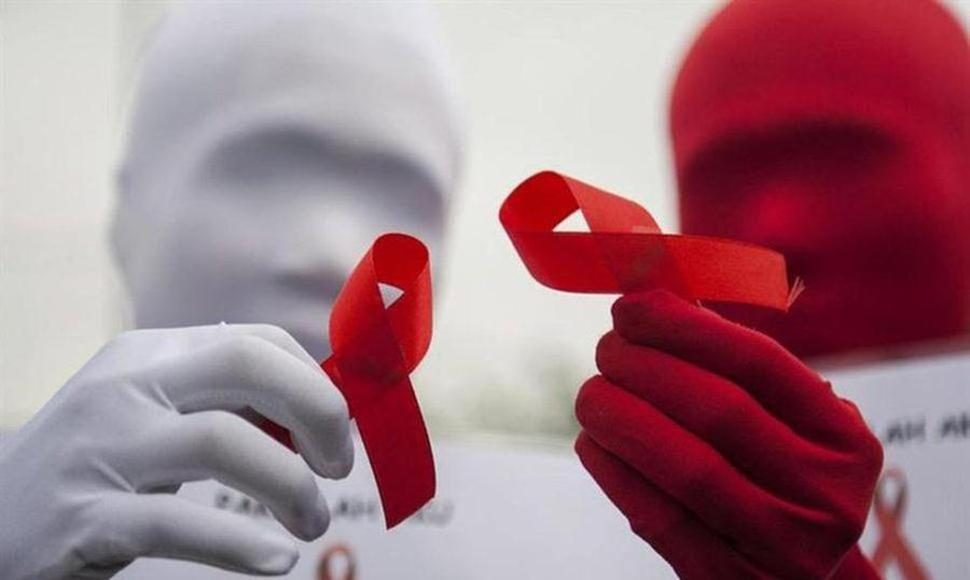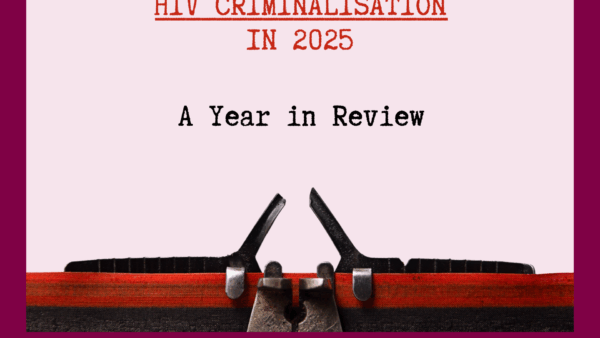
A network of organisations fights against HIV criminalisation law in Mexico Google translation (see below for original article in Spanish)
Mexico, Oct 29 (EFE) .- Twenty NGOs have set up the Network against HIV Criminalization after several Mexican sates try to tighten existing but little known laws, that sanction the possibility of spreading the virus or other sexually transmitted infections.
“The objective (of the network) is to stop a witch hunt, because it was surprising that in the last two years three different (state) congresses have been discussing” this law, stated Leonardo Bastida, head of Information of the group Letter S.
In Mexico, 30 of the 32 states contain in their criminal codes the “crime of transmission”, which sanctions those who can transmit a non-curable disease to another person.
“The possibility of transmission is sanctioned, even if it is involuntary, for example, by ignorance, said Bastida, who produced a study that determined that since 2000, 39 criminal proceedings were filed for that cause.
There are 15 reported cases in Veracruz, nine in Sonora, five in Tamaulipas and in the State of Mexico, three in Chihuahua, one in Mexico City and one in Nuevo Leon.
Most of these were resolved with administrative fines, although a person in Sonora is serving a 10-year sentence, despite the fact that “you can not clearly see how the virus is acquired.”
Many state penal codes were born in the first half of the twentieth century with this concept, although at the beginning there was talk of venereal diseases and it was usually circumscribed to syphilis.
The codes were modified to include new terms. And even in states like Coahuila (in the north) a specific chapter on HIV was created.
Currently, only Aguascalientes and San Luis Potosí do not criminalize this crime, although in the second state they tried only a year ago, without success, to legislate in this regard.
In the southeastern state of Quintana Roo, the issue is still hot after a congresswoman proposed tightening legislation, with sentences of up to 15 years.
“For her, this was to benefit and to reduce HIV cases, but we told her that this was not the right way,” Édgar Mora, president of the Círculo Social Igualitario association, told Efe.
Together with other NGOs, the State Human Rights Commission and the National Commission of Human Rights (CNDH), they established discussion groups with a group of legislators and it was agreed, although the vote on the plenary is still pending, to overturn the article 113 of the Criminal Code of Quintana Roo.
For the 26 NGOs that have formed the Network of organizations against HIV Criminalization, there is a fear that, if laws are tightened, prevention and detection will decrease.
“That people stop being tested for HIV for fear of getting positive and, subsequently, having to face justice,” Mora said.
In Veracruz, the Chamber of Deputies approved in 2015, unanimously, to modify the local penal code to add the term “contagion” to the term “sexually transmitted infections”, Patricia Ponce, member of the Multisectoral Group on HIV / AIDS and STI from Veracruz, told Efe.
Even before the law existed, there was no definite sanction. With the reform of article 158, six months to five years of imprisonment were stipulated.
“Any person who in a ‘willful’ way transmits HIV is penalized, which is a very ambiguous word,” said the doctor.
Several state-run NGOs unsuccessfully attempted to repeal the article by the state Congress and, with the support of the CNDH, filed an unconstitutional appeal to the Supreme Court of Justice of the Nation (SCJN), where it is still under discussion.
Ponce is confident that the resolution of the Supreme will be favorable. “It is important that the Supreme Court declares in favour of health, life, and human rights,” he said.
Otherwise, she fears that other states will bet on criminalizing laws. “The deputies, and congressmen are deeply ignorant” in the matter, he explained.
In Mexico, it is estimated that there are about 220,000 people with HIV, although about 100,000 of them are unaware of it.
The hardening of the laws would also impact on the LGBT community. “We have not understood in 30 years what HIV is, and this results in stigma, discrimination and the replication of speeches against homosexuality,” Bastida said.
On a global scale, 68 countries have laws in force, with Russia accounting for the highest number of defendants in the last two years with 23 cases, according to the HIV Justice Network.
Published in La Vanguardia on Oct 29, 2017
——————————————————–
Una red de ONG lucha contra ley que criminaliza el VIH en México
México, 29 oct (EFE).- Una veintena de ONG se han configurado en la Red contra la Criminalización del VIH, después de que varios estados mexicanos intentan endurecer las leyes, ya existentes aunque poco conocidas, que sancionan la posibilidad de contagiar el virus u otras infecciones de transmisión sexual.
“El objetivo (de la red) es que no empiece una cacería de brujas, porque fue sorprendente que en los últimos dos años se haya discutido en tres congresos (estatales) diferentes” esta ley, explicó a Efe Leonardo Bastida, jefe de Información de la entidad Letra S.
En México, 30 de los 32 estados contienen en sus códigos penales el “delito de peligro de contagio”, que sanciona a quien pueda transmitir una enfermedad no curable a otra persona.
Se sanciona “la posibilidad” de transmisión, aunque sea de forma involuntaria, por ejemplo, por desconocimiento, afirmó Bastida, quien elaboró un estudio que determinó que, desde el 2000, se registraron 39 procesos penales por dicha causa.
Se reportan 15 casos en Veracruz, nueve en Sonora, cinco en Tamaulipas y en el Estado de México, tres en Chihuahua, uno en la Ciudad de México y otro en Nuevo León.
La mayoría de estos se resolvieron con multas administrativas, si bien una persona en Sonora cumple una pena de 10 años, pese a que “no se puede comprobar de forma clara cómo se adquiere el virus”.
Muchos códigos penales estatales nacieron en la primera mitad del siglo XX con esta figura, si bien al principio se hablaba de enfermedades venéreas y se circunscribía habitualmente a la sífilis.
Los códigos fueron modificándose para incluir nuevos términos. E incluso en estados como Coahuila (norte) se creó un capítulo específico sobre VIH.
Actualmente, solo Aguascalientes y San Luis Potosí no tipifican este delito, aunque en el segundo estado hace apenas un año se buscó, sin éxito, que se legislara al respecto.
En el suroriental estado de Quintana Roo, el tema sigue candente después de que una diputada propusiera endurecer la legislación vigente, con penas de hasta 15 años.
“Por parte de ella, esto era para beneficio y para disminuir los casos de VIH. Pero le manifestamos que esta no era la manera adecuada”, contó a Efe el presidente de la asociación Círculo Social Igualitario, Édgar Mora.
Junto a otras ONGs, la Comisión Estatal de DD.HH. y la Comisión Nacional de los Derechos Humanos (CNDH) se establecieron mesas de discusión con un grupo de legisladores y se acordó, si bien aún falta la votación del pleno, la derogación del artículo 113 del Código Penal de Quintana Roo.
Para las 26 ONGs que han conformado la Red de organizaciones contra la Criminalización del VIH, existe el miedo de que, si se endurecen las leyes, disminuya la prevención y la detección.
“Que la gente deje de hacerse la prueba del VIH por temor a salir reactiva y, posteriormente, tener que enfrentar la justicia”, relató Mora.
En Veracruz, la Cámara de Diputados aprobó en 2015, por unanimidad, modificar el código penal local para agregar al delito “del contagio” el término “infecciones de transmisión sexual”, dijo a Efe la integrante del Grupo Multisectorial en VIH/Sida e ITS de Veracruz Patricia Ponce.
Si bien antes existía la ley, no había sanción determinada. Con la reforma del artículo 158, se estipularon de seis meses a cinco años de cárcel.
“Queda penalizada cualquier persona que de manera ‘dolosa’ transmite el VIH, que es una palabra muy ambigua”, indicó la doctora.
Varias ONGs estatales intentaron sin éxito que el Congreso estatal derogara el artículo y, con el apoyo de la CNDH, presentaron un recurso de inconstitucionalidad a la Suprema Corte de Justicia de la Nación (SCJN), donde todavía se está debatiendo.
Ponce se muestra confiada en que la resolución del Supremo será favorable. “Es importante que la Corte Suprema declare a favor de la salud, de la vida, y de los derechos humanos”, indicó.
De lo contrario, teme que otros estados apuesten por leyes criminalizadoras. “Los diputados, diputadas y congresos son profundamente ignorantes” en la materia, explicó.
En México se estima que hay unas 220.000 personas con VIH en México, si bien unos 100.000 de ellos lo desconocen.
El endurecimiento de las leyes impactaría, además, sobre el colectivo LGBT. “No hemos entendido en 30 años qué es el VIH, y ello deriva en estigma, discriminación y la réplica de discursos contra la homosexualidad”, denunció Bastida.
A escala global, 68 países mantienen leyes vigentes en la materia, siendo Rusia el que mayor número de procesados registra por dicha causa en los últimos dos años con 23 casos, según HIV Justice Network.









